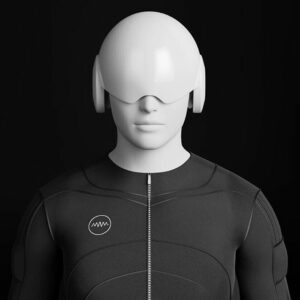How about feeling virtual reality experiences? Up to now, VR has concentrated on the visual side, being able to see your hands or virtually pick up objects in VR. But almost nothing has been done on the physical aspect outside of blowing air with a fan or changing the temperature in a room.
Enter the Teslasuit, which promises to let you feel your virtual reality experiences. The company behind it (no relation to Tesla Motors) describes it as:
World’s first full body smart textile tactile feedback suit that lets you feel the virtual reality.
Feeling Virtual Reality
Here’s the Futurist’s description of what you might call a VR wearable:
Ultimately, the device works by using integrated EMS (Electro Muscular Stimulation). The range can vary—from a gentle breeze to the impact of a speeding bullet…the latter may not sound like a terribly enjoyable experience, but of course, it is simulating the sensation (not giving you the full on experience).
It is surprising minimal in appearance, very different from many of the hand sensors in development for VR. There’s no wires, nothing to strap on your limbs.
In fact, it looks a lot like a wearable fitness shirt. What you are wearing is a suit comprised of sensors that create the feeling of movement and touch in virtual reality. The suit is modular so you can buy different components or the entire set:
Different wearable accessories, called modules, are available separately. The modules include the T-Belt, the T-Glove, and a jumpsuit known as the “Smart Textile.” However, when added together, they function like a suit.
Teslasuit is looking to go to Kickstarter shortly and it would be surprising if it didn’t meet its funding goals. The Teslasuit Pioneer Development Kit full body suit is available for pre-order but it will set you back $1,499.
It’s a fascinating development in virtual reality that could transform our experience of media as the technology matures. Likewise, it could give a whole new meaning to the idea of experiential learning.
There’s not a lot of images of the Teslasuit online, but a couple of short videos will give you an idea of what it does.
Emory Craig is a writer, speaker, and consultant specializing in virtual reality (VR) and generative AI. With a rich background in art, new media, and higher education, he is a sought-after speaker at international conferences. Emory shares unique insights on innovation and collaborates with universities, nonprofits, businesses, and international organizations to develop transformative initiatives in XR, GenAI, and digital ethics. Passionate about harnessing the potential of cutting-edge technologies, he explores the ethical ramifications of blending the real with the virtual, sparking meaningful conversations about the future of human experience in an increasingly interconnected world.

